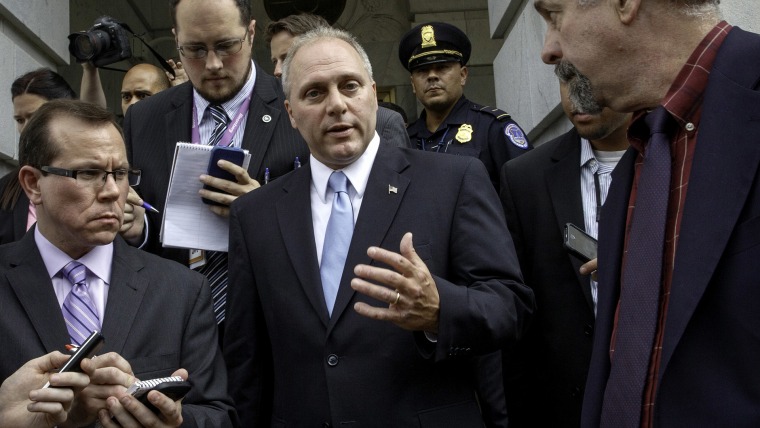House Majority Whip Steve Scalise (R-La.) delivered the keynote address at the National Prayer Breakfast in D.C. last week, and devoted much of his remarks to his recovery from last year's shooting that nearly killed him. It was his faith, the Republican said, that helped him persevere.
But Scalise ran into a little trouble when he decided to share some thoughts on American history.
"This was a nation founded with a deep belief in God. Our founding fathers talked about it when they were preparing to draft the Constitution. In fact, Thomas Jefferson -- who was the author of the Constitution -- if you go to the Jefferson Memorial right now, go read this inscription from Thomas Jefferson: 'God who gave us life gave us liberty. Can the liberties of a nation be secure when we have removed a conviction that these liberties are the gift of God?'"You can't separate church from state.... People would say, you know, when you're voting on issues, how do you separate your faith from the way you vote? Faith is part of who you are."
OK, there's a lot to unpack here, so let's take this one step at a time.
We know that despite Scalise's claim, Thomas Jefferson didn't write the Constitution. He was actually in France at the time the Constitution was crafted. Jefferson did write the Declaration of Independence a decade earlier, but that isn't the same thing. (That's not to say Jefferson was irrelevant -- his Virginia Statute for Religious Freedom likely helped influence the drafting of the First Amendment -- but to say Jefferson was the Constitution's "author" is plainly wrong. That title largely belongs to James Madison, who, incidentally, also championed the separation of church and state.)
We also know that while Jefferson's approach to religion was complex -- see the Jefferson Bible, for example -- his approach to religious liberty was straightforward: he was an ardent champion of church-state separation. It's what makes Scalise's reliance on Jefferson to argue against the principle so spectacularly wrong.
You've heard of the "wall of separation" between church and state? The metaphor comes by way of a letter Jefferson wrote in 1802 to the Danbury (Conn.) Baptist Association, describing the purpose of the First Amendment.
"Believing with you that religion is a matter which lies solely between man and his God, that he owes account to none other for his faith or his worship, that the legitimate powers of government reach actions only, and not opinions, I contemplate with sovereign reverence that act of the whole American people which declared that their legislature should 'make no law respecting an establishment of religion, or prohibiting the free exercise thereof,' thus building a wall of separation between Church and State," the then-president wrote.
My friend and former colleague Rob Boston, a national expert on the issue, added this morning:
Scalise's argument fails because Jefferson was one of the strongest advocates of separation of church and state ever to occupy the White House.... As president, Jefferson refused to issue proclamations calling for official days of prayer and fasting. "I do not believe," he observed in an 1808 letter, "it is for the interest of religion to invite the magistrate to direct its exercises, it disciplines or its doctrines...."Scalise relies heavily on a quote from Jefferson that is engraved on the Jefferson Memorial in Washington, D.C.... What Scalise fails to realize is that it was quite possible for Jefferson to hold a belief like this yet still insist that freedom of conscience be extended to all and that the government refrain from meddling in religious matters.
Indeed, I'm not altogether sure Scalise even understands the constitutional principle with which he disagrees. The congressman noted in his remarks, for example, that when Americans vote, they're inevitably influenced by their beliefs. That is, of course, true.
But it's not an argument against church-state separation. The point of the principle is to mandate government neutrality on religious issues, allowing people to pursue their own paths without interference from the state. It doesn't preclude voters from being influenced by their own personal beliefs.
For the House Republican Whip, you "can't separate church from state." In the United States, we've been trying to do exactly that for nearly a quarter of a millennium. Scalise may wish to change that, but if he does, he shouldn't look to Jefferson as an ally.
